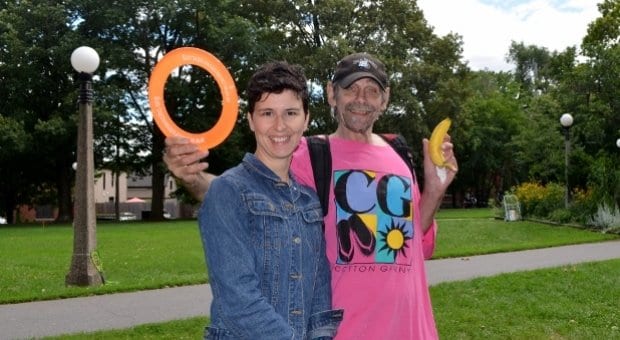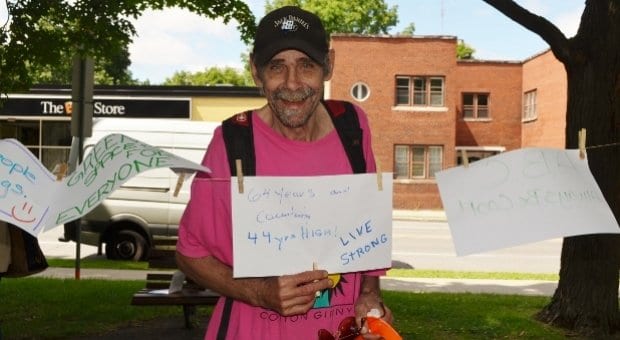
CCHC harm-reduction worker Sarah Brown and park user Brian Lyon. Credit: Bradley Turcotte
Multiple service agencies gathered at Somerset Street West’s Dundonald Park July 24 to promote harm reduction and highlight services available to Ottawa residents grappling with addiction.
Openly gay Centretown Community Health Centre (CCHC) board president Jeff Morrison says that although Ottawa’s queer community can benefit from harm-reduction services, the goal of these services transcends sexual orientation.
“We feel that harm reduction and specifically the notions of safe injection sites are beneficial from a population health standpoint, but this is really one of these issues that transcends all sorts of social lines,” he says.
In addition to CCHC, representatives from the AIDS Committee of Ottawa (ACO), Somerset West Community Health Centre, the Campaign for Safer Consumption Sites in Ottawa, Operation Come Home, Centre 507 and the City of Ottawa attended the event.
Brian Lyons, a former intravenous drug user, attended the two CCHC focus groups that assisted in the conceptualization of the event. Born close to the park, Lyons says he’s seen the public space change dramatically in the 60-plus years he’s frequented the area.
“This is my home. I think [the event] was a success,” he says. “A good split of individuals from different areas coming together for a good time in the park.”
A clothesline with supportive, handwritten notes about addiction hung between two trees; CCHC community engagement worker Lindsay Snow says focus-group attendees suggested posting the messages to encourage de-stigmatization.
Claire Touchette, ACO’s harm-reduction coordinator, says most Canadians who feed the stigma around harm-reduction programs misunderstand the programs’ goal.
The mindset that abstinence is the only option to combat addiction is another widely held opinion that acts as a disservice to drug users, CCHC harm reduction worker Sarah Brown says.
“If you’ve got a problem with drugs or alcohol you quit, or even with gambling, you get better, you quit and you never look back,” she says. “I think that that’s really unrealistic. It’s a lack of education. Too many people don’t know enough about needle distribution programs or supervised consumption sites, so they assume that they are encouraging drug use or supporting drug users to keep living a horrible lifestyle, when in fact it is not what it is at all.”
In conjunction with 8-80 Cities, CCHC began implementing its plan to revitalize Dundonald Park earlier this year. The aim of the revitalization is to raise the profile of the park among community members and increase activity in the space without displacing park users who are in need of harm-reduction services.
Several focus group participants told CCHC that police who patrol the park engage in profiling. “Not necessarily the police coming when there was an incident, but it seemed like additional or extra surveillance when it wasn’t needed,” Brown explains. “We heard from people who may have just been sitting or spending time in the park quietly who were still being harassed or approached by police. People weren’t allowed to spend time in the space without being hassled. And unfortunately, we heard stories about police brutality, where we heard about people being quite violently arrested.”
Snow adds that there are two sides to every story and CCHC plans to discuss policing of the park with the community police officer for Centretown, Constable Matthew Hunt.
Hunt tells Xtra that the revitalization appears to have had a positive impact on the park. Though as the newly appointed community officer for Centretown, the Glebe and Old Ottawa South, he is not yet entirely familiar with the issues at Dundonald Park, he notes.
“That’s other units that they are probably talking about who are patrolling on bikes and walking the beat. I’ve been around the park, and all I’ve seen is positive experiences there, as far as people and families,” he says.
CCHC’s goal is to work with the police as partners to “make sure the park is safe but at the same time not at the expense of people who are using in the park,” Snow says.
“It’s really important for people who use illegal substances to feel that they are a part of the community, because they are. Period. It’s a health issue. It’s not a social or moral issue. People are people first,” Snow adds.


 Why you can trust Xtra
Why you can trust Xtra


